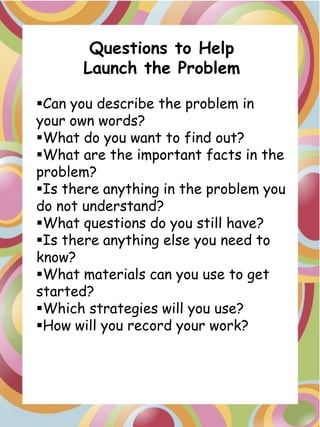
Effective questioning for ps
- 1. Questions to Help Launch the Problem Can you describe the problem in your own words? What do you want to find out? What are the important facts in the problem? Is there anything in the problem you do not understand? What questions do you still have? Is there anything else you need to know? What materials can you use to get started? Which strategies will you use? How will you record your work?
- 2. Questions to Differentiate Instruction While Students Explore the Problem To assess student progress, ask: What have you done so far? Explain how you are organizing your work. What strategies have you used? Explain how you have used them. Does your answer seem reasonable? Do you see a pattern? Can you describe the pattern? Have you accounted for all possibilities? How can you be sure? Can anyone explain it another way? To help students who are struggling: Describe the problem to me in your own words. Are there any words you don’t understand? What questions are you trying to answer? What strategies have you tried so far? Can you make a table? Draw a picture? Act it out? Have you solved a similar problem? Can you make the numbers easier? Are there other material you can use to help you? What ideas have we learned that may be helpful to you? To help student identify any important information they may have overlooked, ask questions that are specific to the problem: Is there another step you may need to start with? Does your solution make sense? How can you convince me?
- 3. Questions to Differentiate Instruction While Students Explore the Problem To challenge students who have successfully solved the problem ask: Will your strategy always work? Can you find other solutions? Is there another way to solve the problem? What would happen if…? What patterns did you see? Can you extend the pattern for x cases? What if you stared with a different number? What other problems have we solved that are like this one? Can you explain your work to the class? Questions to Ask During the Summarize Phase of the Problem Solving Why did you decide to do that step? What did you learn from it? Do you agree with what ___________ did? Why or Why not? Did anyone get a different answer? If so, who is correct? Can you justify your reasoning? Did anyone solve the problem a different way? Can you describe your work? Who can restate what ___________ just said? Will this method always work? Can you find a situation where is will not work? What did you learn from doing this problem?